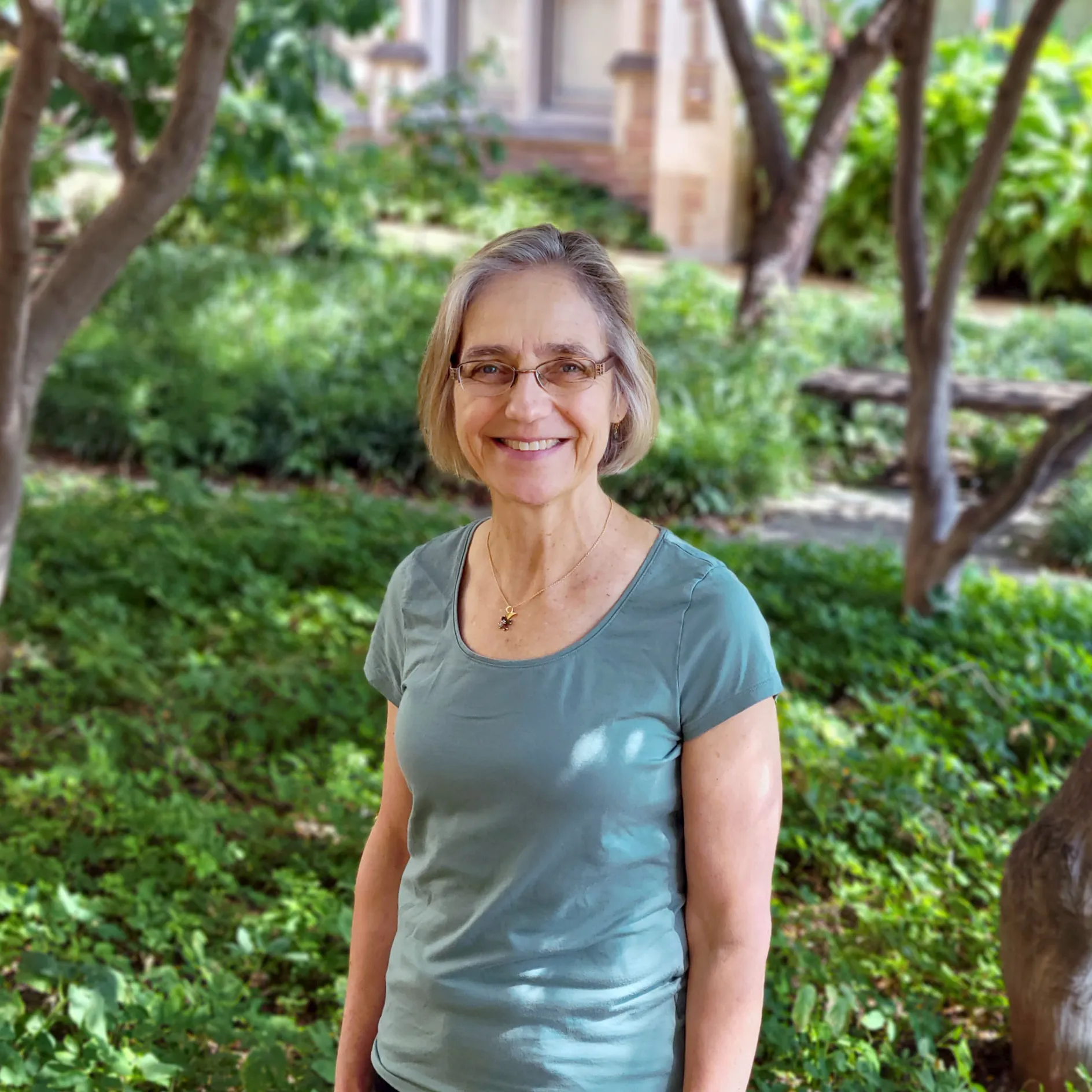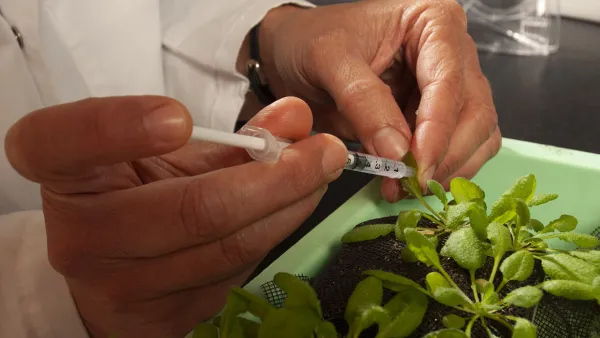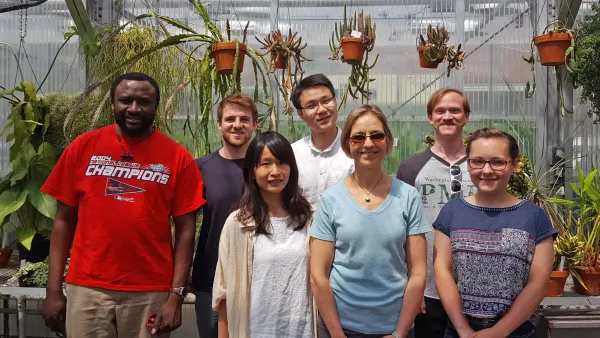Selected Publications
Chung, K. M., Demianski, A. J., Harrison, G. J., Laurie-Berry, N., Mitsuda, N., Kunkel, B. N. 2022. Jasmonate Hypersensitive 3 (JAH3) negatively regulates both jasmonate and ethylene-mediated responses in Arabidopsis. J. Exp. Bot. In Press. erac208, https://doi.org/10.1093/jxb/erac208
Djami-Tchatchou, A. T., Li, A., Li, Stodghill, P., Filiatrault, M. J. and Kunkel, B. N. Identification of IAA-regulated genes in Pseudomonas syringae pv. tomato strain DC3000. 2022. J. Bacteriol. 204. e00380-21 journals.asm.org/doi/10.1128/JB.00380-21.
B. N. Kunkel and J. Johnson. 2021. Auxin plays multiple roles during plant-pathogen interactions. Cold Spring Harbor Perspectives: Auxin Signaling. Editors: Dolf Weijers, Karin Ljung, Mark Estelle, and Ottoline Leyser.Cold Spring Harb Perspect Biol doi: 10.1101/cshperspect.a040022.
Djami-Tchatchou, A. Harrison, G., Harper, C., Wang,R., Prigge, M. J., Estelle, M. and Kunkel, B. N. 2020. Dual role of auxin in regulating plant defense and bacterial virulence gene expression during Pseudomonas syringae PtoDC3000 pathogenesis. Molec. Plant-Microbe Interact. 33: 1059–1071. doi.org/10.1094/MPMI-11-19-0325-R.
Kunkel, B. N. and Harper, C. P. 2018. The roles of auxin during interactions between bacterial plant pathogens and their hosts. J. Exp. Bot. 69:245-254. https://doi.org/10.1039/jxb/erx447
McClerklin, S. A., Lee, S. G., Harper, C. P., Nwumeh, R., Jez, J.M. and Kunkel, B.N. 2018. Indole-3-acetaldehyde dehydrogenase-dependent auxin synthesis contributes to virulence of Pseudomonas syringae strain DC3000. PLoS Pathog. 2018 Jan 2;14(1):e1006811. doi: 10.1371/journal.ppat.1006811. (Abstract/PDF)
Cui, F., Wu, S., Sun, W., Coaker, G., Kunkel, B. N., He, P. and Shan, L. 2013. Pseudomonas syringae type III effector AvrRpt2 promotes pathogen virulence via stimulating Arabidopsis Aux/IAA protein turnover. Plant Physiol. 162: 1018–1029 (Abstract/PDF)
Mutka, A. M., Fawley, S., Tsao, T., and B. N. Kunkel. 2013. Auxin promotes susceptibility to Pseudomonas syringae via a mechanism independent of suppression of salicylic acid-mediated defenses. Plant J. 74: 746–754 (Abstract/PDF)
Melotto, M. and B. N. Kunkel, 2013. Virulence strategies of plant pathogenic bacteria. In: The Prokaryotes, 4th Ed. Rosenberg E, Stackebrand E, DeLong EF, Thompson F, Lory S (eds). Springer-Verlag, Berlin. (Abstract/PDF)
Demianski. A. J., Chung, K. Mi, and B. N. Kunkel. 2012. Analysis of JAZ gene expression during Pseudomonas syringae pathogenesis reveals that JIN1/AtMYC2 regulates only a subset of JAZ genes and that JAZ10 is a negative regulator of disease symptom development. Mol Plant Pathol. 13: 46–57. (Abstract/PDF)
Mellgren, E. M., Kloek, Andrew P. and B. N. Kunkel, 2009. Mqo, a tricarboxylic acid cycle enzyme, is required for virulence of Pseudomonas syringae pv. tomato strain DC3000 on Arabidopsis thaliana. J. Bacteriol. 191:3132-3141. (Abstract/PDF)
Chen, Z., Agnew, J. L., Cohen, J. D., He, P., Shan, L.,Sheen, J. and B. N. Kunkel. 2007. Pseudomonas syringae type III effector AvrRpt2 alters Arabidopsis thaliana auxin physiology. Proc. Nat. Acad. Sci. USA. 104: 20131-20136. (Abstract/PDF)
Laurie-Berry, N., Joardar, V., Street, I. H., and B. N. Kunkel. (2006) The Arabidopsis thaliana JASMONATE INSENSITIVE 1 gene is required for suppression of salicylic acid-dependent defenses during infection by Pseudomonas syringae. Molec. Plant-Microbe Interact. 19: 789-800.
Brooks, D. M., Bender, C. L., and B. N. Kunkel. (2005) The Pseudomonas syringae phytotoxin coronatine promotes virulence by overcoming salicylic acid-dependent defences in Arabidopsis thaliana. Mol. Plant Pathol 6: 629-639. (Abstract/PDF)
Lim, M. T. S. and B. N. Kunkel. (2005) The Pseudomonas syringae gene avrRpt2 contributes to the virulence on tomato.Molec. Plant-Microbe Interact 18:626-633.
Preiter, K., Brooks, D. M., Penaloza-Vazquez, A., Sreedharan, A., Bender, C. L., and B. N. Kunkel. (2005) . Novel virulence gene of Pseudomonas syringae pathovar tomato strain DC3000. J. Bacteriol. 187: 7805-14. (Abstract/PDF)
Z. Chen, A. P. Kloek, A. Cuzick, D. Tang, W. Moeder, D. Klessig, J. McDowell, R. Innes, and B. N. Kunkel (2004) The Pseudomonas syringae AvrRpt2 protein functions downstream or independently of salicylic acid to promote virulence on Arabidopsis thaliana. Plant J. 37:494-504. (Abstract/PDF)
Brooks, D. M, G. Hernandez-Guzman, A. P. Kloek, F. Alarcn-Chaidez, A. Sreedharan, V. Rangaswamy, A. Pealoza-Vazquez, C. L. Bender and B. N. Kunkel. (2004) .Identification and characterization of a well-defined series coronatine biosynthetic mutants of Pseudomonas syringae pv. tomato DC3000. Molec. Plant-Microbe Interact. 17:162-274.
Lim, M. T. S., and B. N. Kunkel (2004) The Pseudomonas syringae type III effector AvrRpt2 promotes virulence independently of RIN4, a predicted virulence target in Arabidopsis thaliana. Plant J. 40:790-798. (Abstract/PDF)
Boch, J., V. Joardar, L. Gao, T. L. Robertson, M. Lim, and B. N. Kunkel (2002). Identification of Pseudomonas syringae genes induced during infection of Arabidopsis thaliana. Mol. Microbiol. 44: 73-88.
Kloek, A. P., M. L. Verbsky, S. B. Sharma, J. E. Schoelz, J. Vogel, D. F. Klessig, and B. N. Kunkel (2001). Resistance to Pseudomonas syringae conferred by an Arabidopsis thaliana coronatine insensitive (coi1) mutation occurs through two distinct mechanisms. Plant J. 26:509-522.
Chen, Z., A. P. Kloek, J. Boch, F. Katagiri and B. N. Kunkel (2000). The Pseudomonas syringae avrRpt2 gene product promotes pathogen virulence from inside plant cells. Molec. Plant-Microbe Interact. 13:1312-1321.




